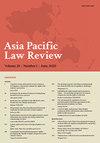The Indian legal system: an enquiry
IF 1.7
4区 社会学
Q2 LAW
引用次数: 0
Abstract
India is one of the most ethnically, religiously and socio-economically diverse countries in the world, and this diversity is protected under Articles 25–31 of the Indian Constitution, which provides constitutional safeguards for religious, cultural and educational rights. On the other hand, India was also under British rule for two hundred years, during which time various Western-style institutions and legal systems and a formal bureaucracy were developed. With respect to these institutions, little has changed since independence. This gives rise to competing legal norms in India, as reflected in its constitution, which is based, first, on democratic aspirations inspired by the English and Welsh common law and French constitutional ideals of liberty, equality and fraternity, and, second, on the need to safeguard the interests of various sectors of the community and emerging religious, ethno-regional and tribal sentiments. The book The Indian Legal System: An Enquiry by Mahendra Pal Singh and Niraj Kumar seeks to address this delicate balance between the various normative forces present in India’s postindependence legal system. It asks whether India has been successful in striking this balance between the various Western and Eastern legal traditions subsumed within it, and if permitting the continuance of certain traditional legal systems is permissible under international human rights law and what the scope and direction for the future development of the legal system might be.印度法律体系:调查
印度是世界上种族、宗教和社会经济最多元化的国家之一,这种多样性受到《印度宪法》第25-31条的保护,该条为宗教、文化和教育权利提供了宪法保障。另一方面,印度也在英国统治下长达200年,在此期间,各种西方式的机构、法律体系和正式的官僚机构得以发展。关于这些机构,自独立以来几乎没有什么变化。这在印度产生了相互竞争的法律规范,正如其宪法所反映的那样,该宪法首先基于英国和威尔士普通法以及法国自由、平等和博爱的宪法理想所激发的民主愿望,其次,基于维护社区各阶层利益和新出现的宗教、民族、地区和部落情绪的必要性。Mahendra Pal Singh和Niraj Kumar的《印度法律体系:调查》一书试图解决印度独立后法律体系中各种规范力量之间的微妙平衡。它询问印度是否成功地在其所包含的各种西方和东方法律传统之间取得了这种平衡,国际人权法是否允许允许某些传统法律制度的延续,以及法律制度未来发展的范围和方向可能是什么。
本文章由计算机程序翻译,如有差异,请以英文原文为准。
求助全文
约1分钟内获得全文
求助全文

 求助内容:
求助内容: 应助结果提醒方式:
应助结果提醒方式:


